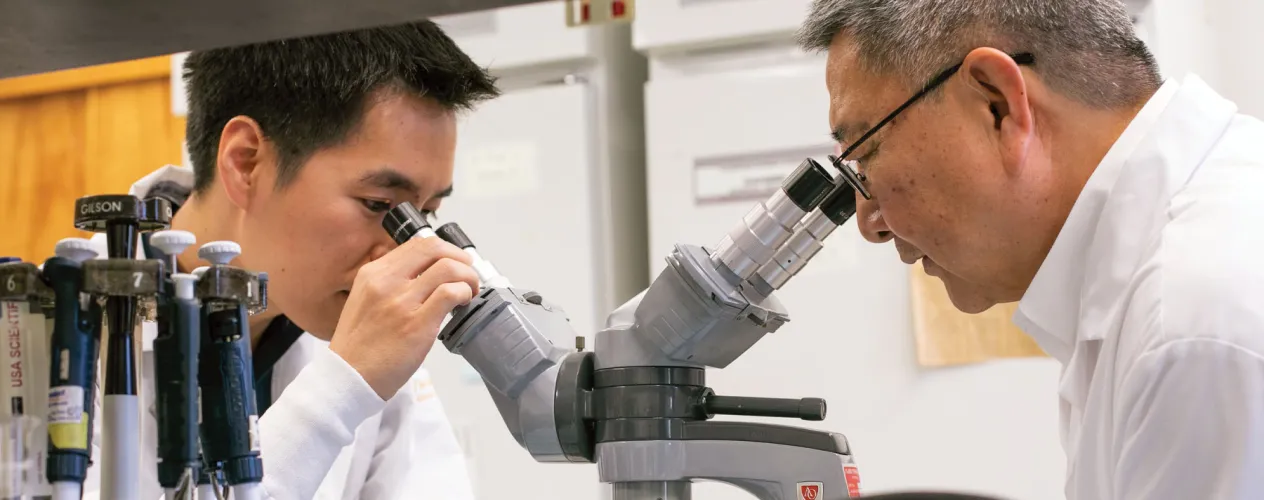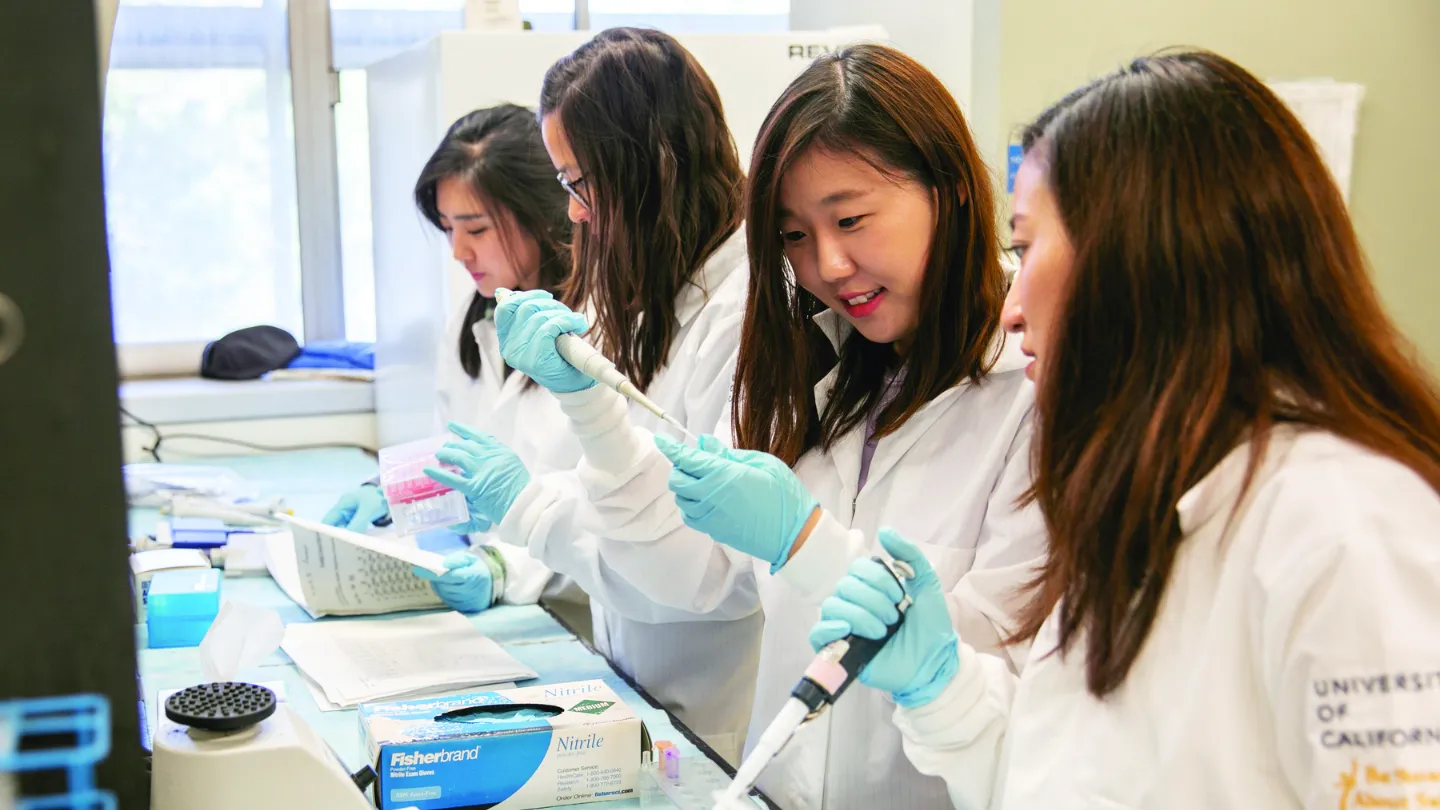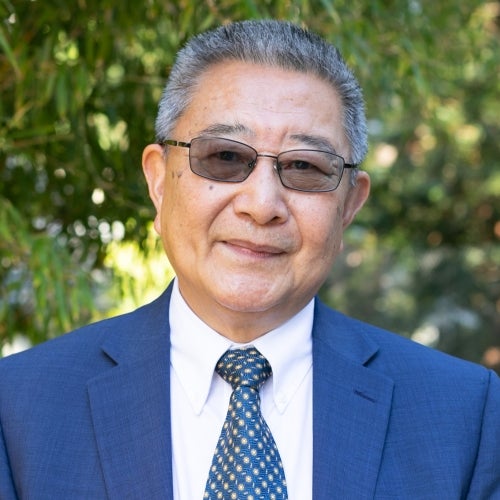Small Changes, Big Implications
FSPH's Cancer Epidemiology Training Program prepares the next generation of researchers to identify molecular-level markers associated with disease risk - findings that inform early detection and prevention strategies.

PANCREATIC CANCER IS TREATABLE when detected early, but since symptoms rarely occur until the disease has spread to other organs, the vast majority of cases are diagnosed in the later stages, making it among the most lethal tumors. According to the American Cancer Society, the five-year survival rate following a pancreatic cancer diagnosis is 9 percent. It is the fourth-leading cause of cancer death in the U.S.
Brian Huang, a fourth-year PhD student at the Fielding School, was drawn to FSPH’s Cancer Epidemiology Training Program by the potential public health impact that could come from research identifying early, detectable signs of the disease, and factors that increase pancreatic cancer risk. “There’s so much mystery around how pancreatic cancer develops, which is why by the time it’s diagnosed, it’s often too late,” Huang says. “I hope my research can contribute to early detection and prevention strategies.”
As a cornerstone of public health, epidemiology has historically identified environmental and behavioral factors that either promote health or contribute to disease risk in populations. Beginning in 1997, the Fielding School’s NCI Cancer Epidemiology Training Program was among the first to train cancer epidemiologists in molecular epidemiology — a then-emerging branch of the discipline, fueled by the rapid advances in molecular biology and genetics.
“In molecular epidemiology we are interested in identifying biological markers — such as serum antibodies, micronutrient levels, protein expression, genetic mutations or methylations — that are associated with disease risk, often through interactions with behavioral influences such as smoking and obesity,” says the program’s director, Dr. Zuo-Feng Zhang, professor of epidemiology and associate dean for research at the Fielding School. By understanding the molecular factors associated with cancer risk, Zhang notes, public health professionals can identify at-risk populations and urge them to avoid the environmental or behavioral exposures that interact with their genetics to trigger the disease. Molecular epidemiology findings can also pave the way for early-detection strategies, or the development of targeted interventions and drug treatments.
The FSPH program trains five PhD students and two postdoctoral fellows. In addition to traditional epidemiology, the trainees learn laboratory processes and methods involved in determining the biological markers used in epidemiological studies. The trainees benefit from a multidisciplinary group of faculty, both from within the Fielding School’s Department of Epidemiology and across other FSPH departments and other UCLA schools and departments — from toxicologists and biostatisticians to health care professionals who treat cancer, and researchers who focus on cancer prevention and control.
For alum Claire Hahni Kim (PhD ’16), the program married her two academic interests: epidemiology and biology. After completing her bachelor’s degree in biochemistry, Kim earned an MPH in chronic disease epidemiology, then worked as an epidemiology analyst at the Los Angeles County Department of Public Health and as a senior research associate at the UCLA Center for Health Policy Research, where she analyzed data from the California Health Interview Survey.
“My molecular epidemiology training integrated the biological aspects of disease research with the methodological foundations of epidemiology,” says Kim, whose PhD studies focused on genetic susceptibility to lung cancer. “I learned not only the statistical aspects of diseases, but also how to explore the biology behind them.” Kim is now a senior manager on the epidemiology/biostatistics team in the Cambridge, Massachusetts, office of the pharmaceutical company Sanofi Genzyme, analyzing clinical data for patients with rare diseases.
Mia Hashibe (MPH ’99, PhD ’02) was part of the first class of cancer molecular epidemiology trainees at the Fielding School. “The idea of combining data-based research with laboratory work was really interesting to me,” she says. “Traditional epidemiology relies to a large extent on self-reported data, but we were beginning to supplement that with biological markers.”
With her FSPH tuition covered by the training program, Hashibe was able to devote 20 hours a week during her PhD studies to working alongside Zhang as a research assistant. After graduation she spent seven years at the World Health Organization’s International Agency for Research on Cancer in France before moving to the University of Utah, where she is currently an associate professor of family and preventive medicine, as well as director of research for the statewide Utah Cancer Registry. Her studies focus on how risk factors such as tobacco, alcohol, lack of physical activity, obesity and diabetes interact with certain genetic variants to increase susceptibility to head and neck cancers. She also helped to start the International Head and Neck Cancer Epidemiology Consortium, of which Zhang is an executive committee member, to encourage collaborations and the pooling of data.
Hashibe was trained just as the field of molecular epidemiology — made possible by the revolutions in molecular biology and genetics, including the first successful sequencing of the human genome — was starting. Two decades later, the field is undergoing seismic shifts as genetic sequencing and information technologies continue to advance at a rapid clip, enabling molecular epidemiologists to examine at a more granular level how cancers develop. “When I was in the PhD program we were typically looking at one genetic variant at a time, and now we’re looking at millions,” Hashibe marvels.
“People used to refer to a ‘black box’ in cancer epidemiology — we knew about the environmental factors, but very little was known about how they interacted with the molecular biology and genetics,” says Wendy Setiawan (MS ’00, PhD ’02), an associate professor of preventive medicine at the Keck School of Medicine at USC, where she studies genetic susceptibility to the development of liver, pancreatic and endometrial cancers, and how environmental factors can increase or reduce individual risk.
The FSPH Cancer Epidemiology Training Program laid the foundation for her successful academic career, Setiawan says, by giving her the ability to design and implement studies as well as teaching her how to collect and handle biological samples — something that was foreign to her previous education in epidemiology. “I still collaborate with FSPH trainees on projects,” she says. “The program’s students are always of the highest quality.”
One of those trainees is Brian Huang, who has worked closely with Setiawan on pancreatic cancer studies. “With molecular epidemiology approaches, we have a chance to move pancreatic cancer in the direction of breast and colon cancer, which are very common but also now very treatable,” Huang says. “Being involved in that effort is very exciting.

